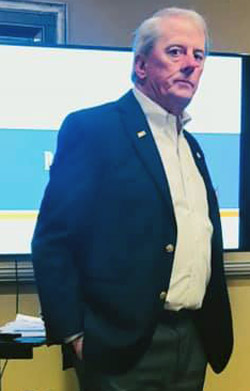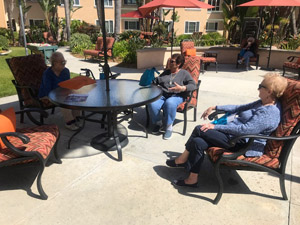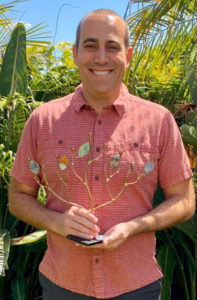
Other items in today’s column include:
*Jewish community coronavirus news
*Political bytes
*San Diego County Judaica
Editor’s note: As part of our continuing series on members of the Jewish community who are running for public office, we look today at the campaign positions of Bernie Rhinerson, who seeks reelection to the District B seat of the San Diego Community Colleges board. Other candidates who have been profiled in the series are Kroc Center for Peace and Justice scholar Sara Jacobs (53rd Congressional District), San Diego City Councilwoman Barbara Bry (San Diego mayor’s race), attorney Joe Leventhal (5th District San Diego City Council), and midwife Sarah Davis (78th Assembly District).


SAN DIEGO — Bernie Rhinerson, 69, is seeking a third four-year term on the San Diego Community Colleges Board of Trustees. With the challenges that community colleges will face in the wake of the coronavirus pandemic, he said, the board will need a seasoned advocate to make certain there will be sufficient funding from the federal and state governments to provide San Diego students with the classes and support that they need. Voters in Sub-District B seemed to agree in the primary election, giving Rhinerson 33,680 votes for 67.35 percent of the total versus 16,327 votes or 32.65 percent to his opponent Daniel Piedra, an attorney who serves as executive director of the Freedom of Conscience Defense Fund. Although Rhinerson’s primary victory was overwhelming, the two candidates will face off again Nov. 3 in a district-wide election, in which voters of Sub-Districts A, B, C, D, and E will exercise their franchise.
Having come out of the world of public relations and government affairs, Rhinerson naturally gravitated to becoming the board’s expert on intergovernmental relations, both in Sacramento and in Washington D.C. For the 115 community colleges throughout California, he chairs a committee that reviews pending legislation. Additionally, he was elected to the national board of the Association of Community College Trustees, on which he serves on the public policy committee.
“We need to be strong advocates to get whatever funding we can get to survive this crisis, both at the federal level and the state level,” Rhinerson commented during an interview. “The governor [Gavin Newsom] will come out with a new budget in May and we all expect huge changes to it that will dramatically affect colleges throughout the state. At this point we don’t know what the implications will be and how we will manage through it. I suspect it will take several years for the state and every level of government to manage through the challenge that this pandemic is going to create.”
In the meantime, the San Diego Community Colleges — which includes the San Diego City, Mesa, and Miramar colleges as well as seven campuses of San Diego Continuing Education — recently converted in-class education to approximately 6,000 classes that will be taught on line, using the Canvas platform. “The professors can put up videos, assignments, and exams,” Rhinerson commented. “Everything can be graded off it, so you can conduct a pretty interesting class off that platform. Before this (pandemic) happened, about 17 percent of our classes were offered online.”
Does he anticipate that online classes will be the wave of the post-pandemic future?
While there probably will be some increase in the number of online classes, he said, “we have so many students with family challenges, economic challenges, and who are food and housing insecure, lower income students, that I believe the face-to-face interactions, not only with the professor as a teacher and mentor, but with other students who form a supportive network, lead to success.”
“A fully online education world where we are all sitting in our homes, not interacting with other students and with professors who could serve as mentors and guides, really takes the heart out of what a complete education is, and I would be fearful that we slip into that,” he said. “I don’t believe that we will.”
Five years ago, the Public Policy Institute of California projected that by 2030 California would have a shortfall of 1.1 million students with bachelor’s degrees needed to serve California’s growing economy, unless the percentage of students earning B.A. degrees was stepped up. Especially lacking were degree programs that could serve specific industries that are important to the state economy. Two years ago, in partial response to this situation, the State of California authorized 15 pilot baccalaureate programs to be offered in selected community college systems up and down the state. Two of these programs were instituted in San Diego County. At the Mesa College campus of the San Diego Community College, a program was instituted to grant four-year degrees in health information management for the people who handle patient records data.
“Our graduates have been going right into Scripps, UCSD Health Care and Kaiser into mid-level management jobs in data management, right here in San Diego,” Rhinerson said. “We took a survey of 244 baccalaureate graduates coming from all 15 programs [another one, in biotechnology manufacturing is at Mira Costa College in Oceanside] and we found that those students, on average, had a $25,000 increase in their income after graduation and that they averaged about $64,000 income. “Eighty-three percent of them were employed after three months following graduation.”
Before the coronavirus pandemic, a bill was introduced in the state Legislature to make those 15 pilot projects permanent, and to expand the kinds of four-year programs the community colleges may offer throughout the state, provided that they do not compete with courses being offered by either the University of California or the California State Universitieis and Colleges.
The survey of the graduates found that 82 percent “thought the degree prepared them well for employment and 92 percent said the community colleges should expand the program,” Rhinerson said. “These students are successful, making more money, getting work force jobs, and getting degrees that are affordable — I think our cost [to participating students] is $11,000.”
However, in the wake of coronavirus, will California be able to afford a continuation of this program and others meant to expand the number of college graduates in California?
In another example, over the last several years, the state has been financing a program called “The California Promise” that “offers free tuition for the first two years to certain students” with financial need, Rhinerson noted. “The state has expanded free tuition dramatically for all community college students. We’ve set up a San Diego Promise, and we’ve raised over $1 million over the last 18 months or so. We supplement California Promise grants for students who come out of San Diego Unified and now charter schools. We have several thousand students in our Promise program who are receiving additional grants beyond the free tuition that the state gives in the California Promise program. That will help them with books and other expenses.”
Currently the state provides funding for districts of about $10,000 per student to the community colleges, less per student funding than K-12 districts and lower per student funding than for state universities. Rhinerson said he believes the grants should be more equitable. But post-coronavirus, how much impact will anyone’s arguments for increased funding make?
On top of all this, Rhinerson and his board colleagues are in the beginning stages of a process to find a successor to San Diego Community College Chancellor Constance Carroll, who served notice that she plans to retire July 30, 2021. “We are starting to develop a search committee that will have representatives from our campus communities” including labor groups (faculty, support personnel) and students. “An outside search firm will help us recruit and we will do a national recruitment” and “at some point the board will look at finalists and do interviews and select a new chancellor. That process will probably take us through next spring.
“The whole crisis will probably throw some wrinkles into that process. Now, we can’t move forward on it, in terms of getting people together. But that is still the timeline we are working under and we’ll make every effort to follow that timeline.”
What kind of candidate will Rhinerson be looking for to replace Carroll, who currently earns $345,413.28 per year?
“We need somebody who had education management experience, managing a large community college or community college district,” he replied. Somebody who has an understanding of the importance of diversity and equity, an understanding of the diverse student population that we serve, and an understanding of the community we serve in San Diego in terms of work force development and meeting the needs of the San Diego region to supply graduates who can keep our economy running. I think this is more important than ever following this crisis.”
*

Jewish community coronavirus news
*The American Jewish Committee (AJC) has produced a supplement to the Passover Haggadah referencing the coronavirus pandemic, which it hopes Jews will read at their seders.
*Keeping their social distance yet enjoying the sun, residents of Seacrest Village Retirement Community socialized in the courtyard of the Jewish community-run senior residence, our correspondent Jeanne Shenkman reported.
*
Political bytes
*San Diego City Council President Georgette Gomez messages that because of the coronavirus, “we have radially shifted how we are operating our campaign for Congress” in the 53rd District from which Susan Davis is retiring. “Most notably we have cancelled in-person fundraisers. That has required us to rethink how to raise the funds we need to continue to fight for the progressive, humanitarian values we believe in.” Her solution? She has been asking people to send in donations via email.
*
San Diego County Judaica



Today’s selection of Judaica focuses on ceremonial objects: At left, Julius Scott Lawrence, 3, grandson of former San Diego Port Commissioner Laurie Black, ponders Shabbat candles. Micah Perlin, a former candidate for the state Assembly, displays at center, a chanukiah presented to him and his wife, Sarah Fine, on the occasion of their wedding by Rabbi Lev Friedman of B’nai Or in Boston. At right, Cantor Cheri Weiss of the San Diego Outreach Synagogue displays tallit that “I wore to be ordained as a cantor and which I will wear when I am ordained as a rabbi in two months. I bought it specifically for the cantorial ordination two years ago, and that was the first time I wore it. This Tallit represents my commitment to serving the Jewish community. It also represents my love of Jewish music and prayer and my determination to use both in helping bring people closer to each other, to Torah and to God.”
*
Donald H. Harrison is editor of San Diego Jewish World. His other articles may be accessed by clicking his byline above. He may be contacted via donald.harrison@sdjewishworld.com